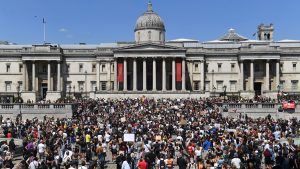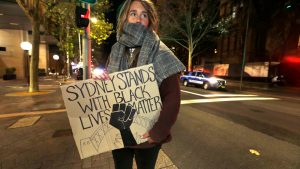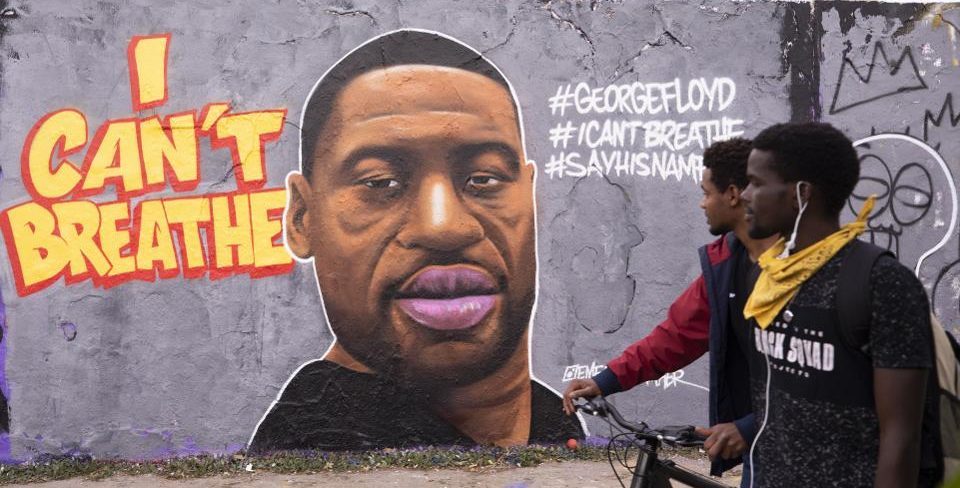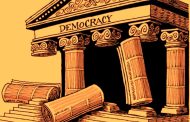
The author
A resident and an academic in the US for many years and now the Vice Chancellor at United States International University – Africa, (USIU) Prof Paul Tiyambe Zeleza tracks the murder of George Floyd far, far back in history, with a cutting edge statistical and Afrocentric insight in this social media essay
George Floyd was sadistically murdered by a policeman with the connivance of several of his colleagues. They were all oblivious to the anguished moaning by Floyd, “I can’t breathe,” and the pleas of witnesses watching the tragic spectacle. The twin cities of Minneapolis-St. Paul erupted into several nights of fierce protests. Before long, demonstrations spread to more than twenty cities across the US from New York in the east to Los Angeles in the west, Detroit in the north to Houston in the south, Seattle in the Northwest to Atlanta in the southeast.
Before George Floyd, there was Ahmaud Arbery, who was killed by two white men, a former police officer and his son, on 23rd February, 2020 while jogging in Glynn County, Georgia. The killers were only arrested 74 days later after the video of the murder went viral. After that there was Breonna Taylor who was shot dead in her own apartment by two policemen in Louisville. Before these three there were many more African Americans shot dead by the police in America’s grisly ritual of sacrificing black lives at the altar of racism.
According to The Washington Post’s database on police killings that goes back to 2015, in 2015 the police killed 994 people, 962 people in 2016, 986 in 2017, 992 in 2018, and 1,004 in 2019. Altogether, out of the 4,728 people killed by the police in the United States since January 1, 2015, 1,252 were black, that is 26.5% while African Americans represent 13% of the country’s population. In short, African Americans are killed by the police at a rate that is twice as high as it is for whites.
The United States has one of the most violent and lethal police forces in the world. This should not be surprising. The origins of policing in the US go back to the ruthless slave patrols of plantation America. Thus, racial profiling and killing of African Americans by the police and white vigilantes betrays the enduring DNA of racism in American law enforcement agencies, society, and everyday life. As The New York Times columnist Charles Blow put it recently in a story on a white woman threatening a black man, a bird watcher, in Central Park that she was going to call the police and tell them that he was threatening her life, “This racial street theater against black peoples is an endemic, primal feature of the Republic.” It allows some ordinary white men and women to weaponize racial anxiety and racial hatred.
Six years before Mr. Floyd was killed, Eric Garner died from a police chokehold also pleading “I can’t breathe.” Floyd joins a long list of African Americans, men and women, boys and girls, whose lives were terminated by the bullets, chokeholds, boots, and ropes of the police and white vigilantes. Millions more engaged in the mundane activities of daily life suffer from racial assaults of various magnitude: driving while black, jogging while black, walking while black, shopping while black, going to school or college while black, partying or playing while black, buying or renting property while black, being a boss while black, bird watching while black, even praying while black… the list is endless. The physical, psychic, emotional, social, economic, and political taxes of being black in America have always been inordinately high.

Uprising indeed!

HE Moussa Mahamat, Chairperson of the AU Commission
The national uprising following Mr. Floyd’s capricious murder signals a country spiraling into dysfunction out of the combustible conjuncture of three forces: the original and enduring sin of slavery and racism, the devastations of the coronavirus pandemic, which has been ineptly managed resulting in the US claiming the dubious distinction of having the world’s highest numbers of cases and deaths, and an economic meltdown that has left more than 40 million people unemployed, which is reminiscent of the darkest days of the Great Depression.
Overseeing the triple emergences fueling America’s crisis of governance and nationhood, which is emblematic of the country’s historic decline is the incomparably disastrous presidency of President Trump. He is arguably the worst president in American history: incompetent, clueless, racist, chauvinistic, bombastic, idiotic, narcissistic, and a pathological liar. He is a tragic embodiment of the famous aphorism from the Ancient Greek writer, Euripides, which can be applied to powerful individuals and nations facing eclipse: “those whom the gods would destroy, they first make mad.” The moment embodied by George Floyd’s murder represents a perfect storm in the enduring madness at the heart of America’s public life and political economy often camouflaged by the country’s awesome military might and national wealth.
George Floyd’s death has not only shaken the United States, it has shocked the world. African leaders and commentators have vehemently condemned the killing. The Chairperson of the African Union Commission, Moussa Faki, issued a blistering critique. According to a statement from the AU, he “strongly condemns the murder of George Floyd that occurred in the United States of America at the hands of law enforcement officers, and wishes to extend his deepest condolences to his family and loved ones.” It went on, “Recalling the historic Organization of Africa Unity (OAU) Resolution on Racial Discrimination in the United States of America made by African Heads of State and Government, at the OAU’s First Assembly Meeting held in Cairo, Egypt from 17 to 24 July 1964, the Chairperson of the African Union Commission firmly reaffirms and reiterates the African Union’s rejection of the continuing discriminatory practices against Black citizens of the United States of America.” His deputy, Kwesi Quartey added his voice, “This is one too many. We may be black, but we are people too… Africa demands a full investigation into this killing.”
Stung by African condemnations and criticisms, American diplomats in various African capitals have tried to quell the storm. According to the Voice of America, “Mindful of America’s image on a continent where China’s influence has grown and where many have felt a distinct lack of interest from the Trump administration in Africa, some U.S. diplomats have tried to control the damage. The ambassador to Congo, Mike Hammer, highlighted a tweet from a local media entrepreneur who addressed him saying, ‘Dear ambassador, your country is shameful. Proud America, which went through everything from segregation to the election of Barack Obama, still hasn’t conquered the demons of racism. How many black people must be killed by white police officers before authorities react seriously?’ The ambassador’s response, in French: ‘I am profoundly troubled by the tragic death of George Floyd in Minneapolis. The Justice Department is conducting a full criminal investigation as a top priority. Security forces around the world should be held accountable. No one is above the law.’”
In the meantime, according to Foreign Affairs magazine, “In a highly unusual move that reflects the degree of distress in the countries they are posted in, the U.S. embassies in Kenya and Uganda also issued statements on Twitter, saying the embassies were ‘deeply troubled’ by the death of Floyd in police custody and that ‘[g]overnment officials should not operate with impunity in any country.’ Several U.S. diplomats said it is rare for U.S. embassies abroad to weigh in on domestic U.S. issues. But in this case, the embassies were compelled to respond after seeing how African leaders reacted to Floyd’s death with anger and dismay. ‘I think some of these posts had to say something because so many Africans are appalled by the footage,’ one U.S. official said. Long-standing racial injustices in the United States also pose a problem for Washington’s soft-power standing in Africa and its position as a vocal proponent of human rights across the continent.”
The United Nations Human Rights Commission joined the fray, tweeting that it, “condemns George Floyd’s killing and urges serious action to stop police killings of unarmed African Americans. This is the latest in a long line.” The High Commissioner, Michelle Bachelet, a former president of Chile, issued a statement: “I am dismayed to have to add George Floyd’s name to that of Breonna Taylor, Eric Garner, Michael Brown and many other unarmed African Americans who have died over the years at the hands of the police — as well as people such as Ahmaud Arbery and Trayvon Martin who were killed by members of the public.”

London end of a protest gone global

And in Sydney, Australia
Anger over George Floyd’s killing rippled around the world. According to The Washington Post of May 29, “Some leaders took the opportunity to express solidarity with marginalized communities in the United States. Canadian Prime Minister Justin Trudeau ended a coronavirus news conference Friday morning by addressing the Canadians who are watching ‘the news out of the United States with shock and horror. Racism is real. It’s in the United States, but it’s also in Canada,’ he said. ‘We know people are facing systemic discrimination, unconscious bias and anti-black racism every day.’”
In Europe, “Norway’s Princess Martha Louise also took to social media to condemn Floyd’s death, sharing a photograph of a woman holding a sign that read ‘George Floyd’s life mattered.’ In the post, she called out the actions of the officers involved, deeming them ‘monsters’ and urging people to ‘wake up and stop the inhumanity.’” The leader of the British Labor Party, Keir Starmer, tweeted, “George Floyd must not become just another name. His shocking death should be the catalyst for change. To build a better society we must stand together against racism and injustice.”
America’s perennial critics also weighed in. “Turkish President Recep Tayyip Erdogan said a ‘racist and fascist’ approach led to Floyd’s killing and called for the perpetrators to be brought to justice. ‘We will be monitoring the issue,’ he tweeted…. On his English-language Twitter account, Iran’s supreme leader, Ayatollah Ali Khamenei, retweeted a tweet that read, “If you’re dark-skinned walking in the US, you can’t be sure you’ll be alive in the next few minutes.”
Predictably, China seized on the uproar over Floyd’s death to score points and as payback for criticism from the US on China’s draconian responses to massive protests in Hong Kong, and China’s treatment of Africans. The editor of the Global Times, a state affiliated paper wrote sarcastically, “Hong Kong’s rioters and police should carefully watch how the ‘democratic U.S.’ deals with the chaos in Minnesota” and accused the US of “double standards.” For its part, the state-run China Daily newspaper tweeted footage from the US protests with the hashtags #GeorgeFloydWasMurdered and #BlackLivesMatter.
Progressive Pan-African movements, activists, and governments must raise the costs of denigrating and destroying the lives and livelihoods of Its peoples anywhere in the world, on the continent and in the Diaspora, whether in Europe, the old imperial and colonial architects of the modern oppressive world capitalist system; the Americas that sanctified racial capitalism; China, the aspiring superpower of the 21st century, with its own superiority complexes and anti-African racism recently on display during the coronavirus pandemic in which Africans were targeted; or others in the global South who seek to perpetuate in the 21st century the hierarchies and mythologies of what W. E.B. Dubois identified as “the problem of the Twentieth Century is the problem of the color line.”
For me, what I find so sad and tragic about George Floyd’s brutal murder, is its predictable familiarity. Six years ago I wrote about other killings of African American that caused an outpouring of rage which is reproduced verbatim below. The script remains the same. The anguish remains the same. The rhetoric remains the same. The public and political polarizations remain the same. The despair and hopes for change remain the same.
The protests after each tragic death reflect accumulated anger, pain, tiredness, frustration, and sadness at the African American condition in America over four centuries of slavery, slave codes, black codes, lynching, racial segregation, the new Jim Crow of mass black incarceration, and a litany of micro aggressions seared into the collective memories of African Americans over generations. In short, being black in America is exhausting and often dangerous.




























